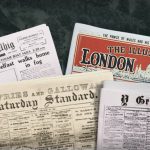This week at The Archive we have been busier than ever, as we have added 294,076 brand new pages to our collection. This includes eleven brand new titles, with our new publications covering the counties of Kent, Hampshire, Lincolnshire, Cambridge, and Suffolk, as well as London.
Meanwhile, we have updated 36 of our existing titles – so read on to discover about all of our updates and new additions of the week, and also to find out more about Captain Matthew Webb, who on 25 August 1875 became the first recorded person to swim the English Channel.
Register now and explore the Archive
We begin this week by taking a look at the five brand new regional titles we have added over the past seven days, and first up is the Haverhill Echo. Published in the Suffolk market town of Haverhill, which lies close to the borders of Essex and Cambridgeshire, the Haverhill Echo was originally known as the South-West Suffolk Echo.

The South-West Suffolk Echo was founded in 1888 and cost just half a penny. Appearing every Saturday, it was published by W.H. Chevens and his son, and often featured serialised fiction, such as the ‘interesting and powerful story’ Very Hard Times. Still running to this day, and now known as the Haverhill Echo, this newspaper has a circulation of 5,000.
Our next new publication of the week hails not far from Haverhill, and is Cambridgeshire’s Fenland Citizen. The Fenland Citizen is published in the Cambridgeshire market town of Wisbech, which lies in the Fenland district and is famed as an inland port. Previously known as the Fenland Advertiser, the Fenland Citizen actually started out life as the Wisbech Advertiser, and Isle of Ely Journal in 1845.

The Wisbech Advertiser was politically independent, and appeared every Wednesday, circulating in ‘Wisbech, March, Chatteris, Lynn, Long Sutton, Thorney, Whittlesea, and the counties of Cambridge, Huntingdon, Lincoln, Norfolk, Suffolk and Northampton.’ This weekly circulation averaged at 4,500. Published to this day, and still appearing every Wednesday, by the 1980s the Fenland Citizen consisted of 40 pages and cost 24p.
From the Fenlands now to Faversham, and the Faversham News. Originally known as the Faversham News, and East Kent Journal, the Faversham News was established in 1883. A Liberal weekly, it appeared every Saturday and cost one pence. It circulated in ‘Faversham and the district of East Kent,’ providing ‘all the local and district intelligence, together with general news.’

Published in the Kent market town of Faversham, known as a seaport and a brewing centre (the Shepherd Neame brewing company was founded in the town in 1698), the Faversham News is published to this day.
Staying in the south of England for our next new title now, which is the New Milton Advertiser. The New Milton Advertiser was first published in the Hampshire market town of New Milton, which lies just south of the New Forest, in 1928. Serving the New Forest and Christchurch area ever since then, the newspaper also covers Barton-on-Sea and Lymington.

Our final new regional title of the week is the Spalding Guardian. Established in 1881 as the Spalding Guardian and Holbeach, Long Sutton, and Sutton Bridge Advertiser, the Spalding Guardian is published in the Lincolnshire market town of Spalding, which is known as the ‘Heart of the Fens’ and is famed for its tulip production.
The Spalding Guardian initially appeared every Saturday, costing one penny. Liberal in its politics, it circulated ‘extensively in Spalding, Holbeach, Long Sutton, Sutton Bridge, Bourn, and throughout the whole of South Lincolnshire.’ It was published by one Joseph Cooke.

The Spalding Guardian still continues to be published to this day, appearing now every Friday instead of every Saturday.
We now move on to our new titles of the week which have been digitised as part of the British Library’s Heritage Made Digital project, and there are six of these newspaper titles which have joined us this week. Leading the charge is the eminently historic London Chronicle.
An early family newspaper of Georgian London, the London Chronicle was established in 1756 as the London Chronicle; or, Universal Evening Post, becoming simply the London Chronicle in 1765. Appearing three times a week, on Tuesdays, Thursdays and Saturdays, this historic publication was the first newspaper in Europe to publish the American Declaration of Independence; albeit without any explanation of what it was!

Packed with news from across the capital, country and beyond, the London Chronicle covered the comings and goings of royalty, as well as London’s artistic, literary and theatrical events. In 1832 the London Chronicle was absorbed into the London Packet.
Meanwhile, this week also sees the addition of a brand new radical title, Hetherington’s Twopenny Dispatch. Radical unstamped newspaper Hetherington’s Twopenny Dispatch was just one of printer and bookseller Henry Hetherington’s (1792-1849) many publications. Appearing every Saturday, consisting of four pages, and of course costing just two pence, the full name of the radical title was Hetherington’s Twopenny Dispatch and People’s Police Register.
The son of a tailor, Henry Hetherington began his career in printing at a young age. A passionate campaigner for social justice, supporting freedom of the press and universal suffrage, Hetherington was a leading light in a variety of different radical groups, such as the National Union of the Working Classes and the London Working Man’s Association.

Indeed, Chartist Hetherington worked with other radical publishers, such as William Lovett, John Cleave and James Watson, but it was Hetherington’s other publication – the Poor Man’s Guardian – which was at the forefront of the unstamped radical press, which swerved the tax levied on newspapers. Indeed, possession of such a newspaper could end in imprisonment, and Hetherington himself was imprisoned three times for producing unstamped publications.
Meanwhile Hetherington left the editing of his newspaper, Hetherington’s Twopenny Dispatch, to Irish Chartist journalist James Bronterre O’Brien. And within the pages of the Twopenny Dispatch you can find articles on the dreaded newspaper stamp duty, the latest from the Reform Association, as well as addresses ‘To the Working People.’ The Twopenny Dispatch also features a wonderfully satirical column named ‘News of the Day, Twaddle of All Sorts.’
But what did critics think of the socially conscious newspaper? The Atlas has this to say about Hetherington’s Twopenny Dispatch:
It is a weekly paper, compiled without order, in which the mere news is mangled, or crushed into its corner, and in which the same wild and impracticable spirit of complaint makes all things under the sun take the hue of violence. The effect of such writings upon the poor must be apparent to everybody but the writers.
From radicalism now to conservativism, and our next new title of the week, which is the Hour. The Hour daily newspaper was first published on 24 March 1873, costing just one penny, with the watch words of ‘Industry – Liberty – Religion.’ Inspired by a quote from Conservative politician Benjamin Disraeli – ‘Industry, liberty, religion…that is the history of England,’ the Hour stated that it was upon those three ideals that the ‘foundation [of] our entire social structure rests.’
The Hour was unashamedly Tory, proclaiming in its first edition how:
The Politics of ‘The Hour’ will be Conservative – It Will Welcome All Salutary Reforms – It Will Resist All Mischievous Changes – It Will Support Good Measures from Any Party – It Will Uphold a Vigorous National Policy At Home, Abroad, and in the Colonies.
Moreover, the Hour promised to ‘present all the features of a first class Daily Newspaper,’ giving ‘special attention to Mercantile and Shipping Interests.’ Indeed, the Hour featured a column entitled ‘Monetary and Mercantile Affairs,’ as well as section devoted to ‘Shipping Intelligence.’

Meanwhile, the Hour also featured extensive sport’s coverage, for example reporting on the annual boat race. Furthermore, it also contained the latest betting news. In addition to this, the Hour published parliamentary and law notices, news from abroad, and police intelligence, with special attention devoted to the opera.
The Hour was conducted by journalists David Morier Evans and Thomas Homber, who had both previously worked at the Standard. David Morier Evans (1819-1874) was a Welsh financial journalist, and the Hour was very much his baby. Indeed, he had spent all of his means on the newspaper, which after only six short months left him bankrupt. The failed venture, combined with the financial burden, left Evans’s health in ruins, and he passed away on 1 January 1874 aged 54.
From hours to weeks and our next new title, the Week’s News (London). ‘A London Newspaper for English Readers at Home and Abroad,’ the Week’s News (London) was first published on 7 January 1871. A weighty read, consisting of 34 pages, the Week’s News (London) cost three pence and appeared every Saturday.
‘A convenient size,’ and printed ‘on a good quality of toned paper,’ the Week’s News (London) gave ‘the entire news of the week.’ Moreover, it promised that it would:
…be restricted to no special kind of Information, and will be the Organ of No Party. It will take its place as Everybody’s Newspaper…It will be exceptionally the Newspaper for the Family, and for the Professional Gentleman’s Waiting Room.

Aimed at English readers across the globe – with postage costing one pence to the United States, Canada, West Indies, Cape of Good Hope and Australia, and options available for European postage – the Week’s News featured a range of different sections, including ‘Criminal Occurrences,’ ‘Town Talk,’ ‘Military and Naval,’ ‘Court and Fashion,’ and notices of births, marriages and deaths. It was published by Messrs Henry S. King & Co., a company that had strong ties with India, which was founded in 1816 as Smith, Elder & Co. by Henry Samuel King (1817-1878).
Our penultimate new title of the week is the Weekly Mail (London). Published by William David Williams, the Weekly Mail (London) appeared every Sunday, consisting of eight pages and costing two pence. It boasted that it contained ‘more Late Intelligence than all other Sunday papers put together,’ despite being ‘only one third of the price.’ Moreover, it boldly proclaimed how it was ‘generally considered to be the only perfect Weekly Newspaper.’
Considering these brave claims, what could you expect from the Weekly Mail (London)? Well, true to its pledge of offering its readers the latest news, it contained ‘Latest Telegrams,’ with news from across the country and the rest of the world. It also featured a ‘Political Portfolio,’ emigration information, and a section devoted to miscellanies charmingly named ‘Wine and Walnuts.’

Displaying a literary bent, the Weekly Mail (London) also published a section entitled ‘The World of Books,’ whilst an entertaining ‘Etchings’ column was penned by ‘the Lounger in London.’ Meanwhile, within its pages you could find all the latest from police courts, the navy and the army, as well as the fashions for the month.
Rounding off our new titles of the week is the Christian Times, which joins our collection of religious titles on The Archive. ‘Endeavouring to Keep the Unity of the Spirt in the Bond of Peace,’ Christian newspaper the Christian Times was first published on 14 October 1863, costing one pence and published by William Freeman. With a ‘distinct mission’ to ‘fulfil a distinct want of the age in which we live,’ the Christian Times was originally known as the London Christian Times.

Boasting a low price point of only one penny, the new religious title explained:
It is cheap, because cheapness is the evident destiny of English journalism, and because it appeals to thousands of good Christian people in the land, a large proportion of whom cannot afford a dear newspaper.
Indeed, the Christian Times positioned itself as a ‘religious journal,’ which was ‘solemnly consecrated to the services of religion,’ meanwhile eschewing the ‘two evils’ of cant and sectarianism. So what could you expect from the Christian Times? It featured a range of different sermons, including a section called ‘Our Pulpit,’ which published sermons from ministers across the country, for example one entitled ‘Faith in God’ by a Northamptonshire rector.

Other sections within the Christian Times included ‘Sermons and Services,’ and ‘Echoes from the Altar.’ In 1865 the newspaper became the Illustrated Christian Times, including on its front page portraits of religious figures, and on page seven, illustrations of churches, before becoming the Christian Times in 1866.
Meanwhile, we have updated 36 of our existing titles this week, with additions to publications from across England, Scotland and Wales. Of particular note are the over 15,000 pages we have added to the Eastbourne Chronicle, and the over 10,000 pages which we have also added to the Suffolk and Essex Free Press. Meanwhile, we have added over 5,000 pages to the Liverpool Daily Post, the Derby Daily Telegraph and the Birmingham Suburban Times, thus enhancing our newspapers from across Britain’s cities.
Captain Webb’s Channel Trip
In August 1875, stunt performer Captain Matthew Webb became the first recorded person to swim the English Channel, in a feat which captured the British public’s imagination and catapulted him to hero status.
Our new newspaper title Hour gives a blow by blow account of the Captain’s ‘Channel Trip,’ as the publication dubbed it. Hour relates how Captain Webb ‘started on Tuesday [24 August] at four and a half minutes to 1 o’clock,’ diving from Dover’s Admiralty Pier and soon achieving ‘a steady pace.’

About two hours into his swim, Captain Webb ‘had some beer.’ The Hour adds how he only consumed ‘beef tea, brandy, and hot coffee’ whilst he was swimming, and it was estimated that he was averaging about 20 strokes per minute, which gave him a pace of a ‘mile and a half an hour.’
The Hour then gives this narration of Webb’s momentous effort:
At 5 o’clock the captain took a draught of beef tea, and said he felt capital. He was now thought to be six miles from the starting point. At 6 he was believed to be one mile outside the South Sand Head. At ten minutes to 7 he took one beer, and at 7 we saw the South Foreland Light N.N.W. by N.
After this, Captain Webb faced some difficulties, the first occasioned by seaweed, and the next by a jellyfish:
At 8 Webb got into slack water and made straight for the Point. At half-past, when the Dover gun fired, the lad Baker returned from taking the Captain some coffee, and reported that he was as fresh as ever, but complained of the quantity of sea-weed in the water. About an hour after some alarm was occasioned by the Captain saying, ‘I’ve got stung in the shoulder by a jelly-fish,’ but a minute after he added, ‘Right. All right; the smart has now passed.’

Still swimming, Webb had become something of a tourist attraction. A steam tug called Ramble had been ‘engaged by some gentleman at Dover,’ and this vessel came up to check on the Captain’s progress at about 10 o’clock that evening. This visitation occasioned the following report in the Hour, ‘From a Correspondent:’
I have just returned from the special steamer, At 10.20 Captain Webb was about nine miles of the South Foreland, bearing north, and fourteen miles off Dover, bearing west-north-west, swimming strongly and in capital spirits. The weather was fine, wind calm, the sea perfectly smooth, the moon just rising, and tide on the ebb. He had been nine and a half hours in the water, and every apparent prospect of success. The lugger and two small boats are in attendance.
Meanwhile, at 11.30 that night, the Captain was ‘loudly cheered by the passengers of the Calais boat, which came to look at him.’ Some three hours later, in the early morning, Captain Webb asked how much further he had to go, and he was told that it would be another four or five hours. The Hour reports how he said that ‘was all right,’ and later took some brandy.

The Captain was still going at 7 o’clock, when a ‘breeze sprang up,’ and:
...soon the water lost its smoothness, the waves seriously impeding the swimmer, so much so that at one time those on board feared he would succumb, but he struggled bravely on, though it was apparent that the unfavourable weather was beginning to tell on his strength.
But Webb struggled on, and at 10.41 a.m. ‘he stepped on shore, on the sands, about ten yards west of the bathing machines,’ with ‘enthusiastic cheers’ greeting him from those on shore and on the small boats which had gathered to watch. Webb was then:
…immediately rubbed down and taken to the Hotel de Paris in a conveyance. He then took a glass of port, recommended by the French physician, and fell into a sound sleep.

In all, he had been swimming for 21 hours and 40 minutes. A day later, the Hour reports how the adventurer was ‘naturally fatigued by his prolonged exertions, but his health had not suffered, and his sprits were excellent.’
And he was received back in Britain as a hero. The Mayor of Dover met Captain Webb at the Dover Yacht Club upon his return, and Webb returned his thanks by saying, to great applause:
Mr. Mayor, ladies and gentlemen I have to thank you kindly for the cordial reception you have given me to-day, and to assure you I hope I have deserved it in one way, for I did my swimming affair in an honest English way – (loud cheers) – and had a very hard task. Towards the last the sea was rather rough, and I got nearly blinded by the spray, but I am glad I was able to finish by walking to the shore on Calais sands. I thank you for the reception you have given me to-day.

Captain Webb was the toast of the town, a veritable celebrity, and his feat even inspired songs, as advertised in the Hour nearly a month later:
Captain Webb; or The Swim Across the Channel. New Song. By the Author of ‘Our Sailors on the Sea.’ Illustrated with Portrait of Captain Webb.
The Captain – ‘Hero of the Channel‘ – was in demand, having to ‘refuse engagements in all parts of England.’ However, in late September 1875 the Hour reports how Webb would be in attendance at Professor Beckwith’s Annual Benefit, to be held at Lambeth Baths, where he would present swimming prizes.

Sadly, Webb would later take on a stunt he could not survive, in 1883 attempting to swim the Whirlpool Rapids below the Niagara Falls. He left behind a wife and two children.
New Titles
Title | Years Added |
| Christian Times | 1863-1871 |
| Faversham News | 1883-1888, 1890-1896, 1898, 1901-1903, 1905-1906, 1908-1911, 1913-1919, 1986-1987 |
| Fenland Citizen | 1987-1988 |
| Haverhill Echo | 1982-1985 |
| Hetherington’s Twopenny Dispatch | 1836 |
| Hour | 1873-1876 |
| London Chronicle | 1800-1807, 1810-1811, 1813, 1816-1817, 1819-1822 |
| New Milton Advertiser | 1928-1931, 1987-1988 |
| Spalding Guardian | 1992 |
| Weekly Mail (London) | 1860 |
| Week’s News (London) | 1871-1879 |
Updated Titles
This week we have updated thirty-six of our existing titles.
You can learn more about each of the titles we add to every week by clicking on their names. On each paper’s title page, you can read a FREE sample issue, learn more about our current holdings, and our plans for digitisation.
You can keep up to date with all the latest additions by visiting the recently added page. You can even look ahead to see what we’re going to add tomorrow.





